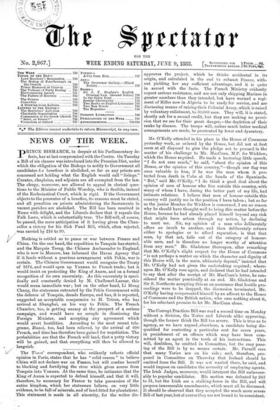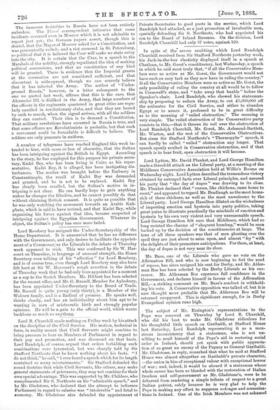The Corrupt Practices Bill was read a second time on
Monday without a division, the Tories and Liberals alike approving, though the former think the Bill too severe. This is true as to agency, as we have argued.elsewhere, a candidate being disqualified for contesting a particular seat for seven years, in punishment of an offence which may have been committed by an agent in the teeth of his instructions. This will, doubtless, be omitted in Committee, but the easy passing of the Bill is by no means certain. Mr. Parnell sees that many Tories are on his side ; and, therefore, proposed in Committee on Thursday that Ireland should be omitted from the Bill. It was not wanted there, he said, and would impose on candidates the neeessity of employing agents. The Irish Judges, moreover, would interpret the Bill unfavourably to popular candidates. His motion was defeated by 243 to 31, but the Irish see a stalking-horse in the Bill, and will propose innumerable amendments, which must all be discussed. It should be observed that they accepted the much more severe Bill of last year,bat of course they are not bound to be consistent. The immense festivities in Russia have not been entirely unbroken. The Times' correspondent intimates that some incidents occurred even in Moscow which it is not advisable to report just yet ; the German papers assert, though this is denied, that the Mayor of Moscow asked for a Constitution, and was peremptorily exiled ; and a riot occurred in St. Petersburg, so political that it is believed the Czar will make no state entry into the city. It is certain that the Czar, in a speech to the Marshals of the nobility, strongly repudiated the idea of making political concessions, and that no constitution of any kind will be granted. There is evidence that the Imperial grants at the coronation are not considered sufficient, and that discontent is wide-spread, though we can scarcely believe that it has infected the Army. The author of "Underground Russia," however, in a letter subsequent to the one we quoted last week, affirms that this is the case, that Alexander III. is disliked in the Army, that large numbers of the officers in the regiments quartered in great cities are regularly enrolled in revolutionary clubs, and that they are bound by oath to march, when the signal arrives, with all the soldiers they can control. Their idea is to demand a Constitution. That military revolutions have occurred in Russia is true, and that some officers are Revolutionists is probable, but that such a movement could be formidable is difficult to believe. The soldiers are only peasants in uniform.



































 Previous page
Previous page